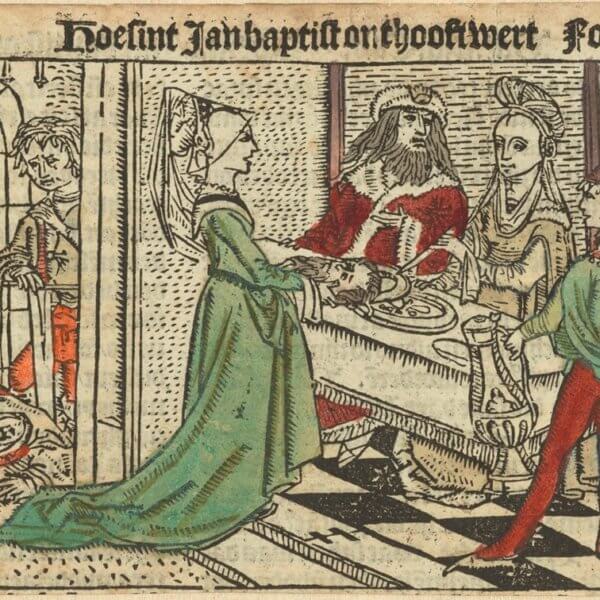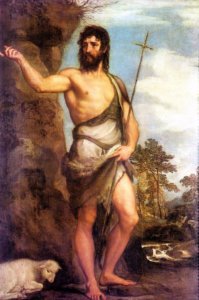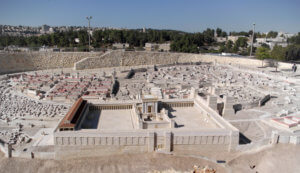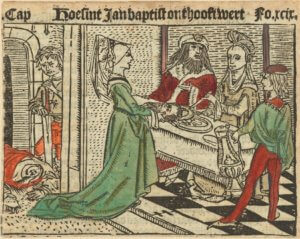
Happy Birthday Herod
Today we’re talking again about how we respond to God. In last week’s gospel, we saw two different responses to God: the unsuccessful response in Jesus’ hometown of Nazareth, where Jesus’ friends and neighbors take offense at him, maybe because they couldn’t believe that God could work in people like them. Those self-doubts kept the Nazarenes from even approaching Jesus for healing and miracles.
The people responded differently to Jesus in the villages all over the Galilee. There they were meeting Jesus for the first time, without carrying all that self-doubt from home into the encounter. They recognize and welcome God’s presence among them, and 5,000 of them dine like royalty on five loaves and two fishes because they experience the present effect of God’s work.
Today we see yet another human response to God’s presence in King Herod’s response to John the Baptist. The story of John the Baptist’s beheading during Herod’s birthday party — where Herod’s stepdaughter danced, while his wife held a grudge, and Herod himself made a well-meaning, but fatal, promise — gives us an opportunity to see another way that our response to God can be complicated — really, really complicated — by our own context and perspective.
John the Baptist
 Remember that John was in the wilderness down by the Jordan baptizing and preaching repentance, telling everyone who had ears that he was preparing the way for Jesus. John had a specific message of repentance for King Herod, who had married his brother’s wife. The Baptizer told Herod that his marriage to Herodias was unlawful, which infuriated Herodias. She held a grudge against the prophet for this, and wanted to kill him, so Herod had the baptizer arrested and locked up, to keep him safe from Herodias. And here’s a fascinating detail. King Herod did this because he feared John, knowing that John was a righteous and holy man, and he protected him. When he heard him, he was greatly perplexed; and yet he liked to listen to him.
Remember that John was in the wilderness down by the Jordan baptizing and preaching repentance, telling everyone who had ears that he was preparing the way for Jesus. John had a specific message of repentance for King Herod, who had married his brother’s wife. The Baptizer told Herod that his marriage to Herodias was unlawful, which infuriated Herodias. She held a grudge against the prophet for this, and wanted to kill him, so Herod had the baptizer arrested and locked up, to keep him safe from Herodias. And here’s a fascinating detail. King Herod did this because he feared John, knowing that John was a righteous and holy man, and he protected him. When he heard him, he was greatly perplexed; and yet he liked to listen to him.
Poetry and faith writer Marilyn McEntyre writes that the prophet’s effectiveness may be in their ability to perplex the powerful, as the prophet’s job is not only to speak truth but also to to trouble — to unsettle — their listeners’ easy and comfortable assumptions. The root meaning of perplexity is “completely entangled.” When we are perplexed, we get wound up in the strands of a problem. We can’t distance ourselves from it OR stop caring how it’s going to work out.
Herod is tangled in the strands of this problem. He’s wound up in his fascination with John, his fear of loss of authority in front of his powerful friends, and his fear of losing his stepdaughter’s affection, but he can’t repent and give up his unlawful marriage with his brother’s wife. When Herod and his important guests are entertained by his stepdaughter’s dancing at his birthday party, the king promises her anything she asks for, even half his kingdom.
Nurturing a Grudge
The girl asked her mother what to request of Herod, and her mother — Herodias — nurturing her grudge against John, replied, “The head of John the baptizer on a platter.” This is not what Herod wanted! Herod thinks that John is a righteous and holy man, and he likes to listen to him — even though John pricks at his conscience and unsettles his understanding of his own power and agency.
Herod is distraught, but he’s made a bold promise in front of his important guests, and he’s not comfortable saying that he got out ahead of himself — that he was wrong and has changed his mind. He sends a guard into the dungeon with orders to return with John’s head. The guard goes to the prison, executes John as ordered, and brings the baptizer’s head back to Herod’s stepdaughter on a platter. The girl gives John’s head on a platter to her mother. Now that’s a birthday party gone wrong.
Is Herod a Bad Man?
Is Herod a bad man? Well, maybe. This is the same King Herod who summoned the magi and their camels off their starpath to Bethlehem to his court in Jerusalem to ask them where this baby king of the Jews had been born. This is also the same King Herod who ordered the killing of all male children under two in an attempt to eliminate the threat he thought Jesus posed to his kingship. And there are plenty of stories of Herod’s brutality.
 But Herod was also a great builder. He rebuilt Solomon’s temple on the Temple Mount in Jerusalem, as well as the grand and complex palaces and water and sewerage infrastructure around the Herodium, Masada, and Caesarea Maritima, his seaside palace on the Mediterranean, which was one of the most significant harbors in the ancient world.
But Herod was also a great builder. He rebuilt Solomon’s temple on the Temple Mount in Jerusalem, as well as the grand and complex palaces and water and sewerage infrastructure around the Herodium, Masada, and Caesarea Maritima, his seaside palace on the Mediterranean, which was one of the most significant harbors in the ancient world.
Herod was the King of Judea, which roughly means King of the Jews. (Remember this is also the title the crowd uses to mock Jesus when he’s dying on the cross.) But Herod’s power is seriously compromised. Herod was a Roman client king — a local appointed by the Roman Senate to govern the region for them, but he reported up to the Roman Senate. For power purposes, Herod was at best middle management in the field, under the thumb of the home office. Judea was under Roman occupation, and Herod was neither a Roman citizen nor really Jewish. Only his father was Jewish, and Herod was always under fire from the dominant religious sects of the time — the Pharisees and Sadducees — for not being Jewish enough. So Herod was getting it from both sides.
Herod’s Stepdaughter
 And while Renaissance painters — and even an Oscar Wilde play made into a Richard Strauss opera — casts his stepdaughter as a temptress and Herod’s promise of anything she asks for as an old letch’s response to her seduction, the Greek word for her in Mark’s gospel is korasion, which means little girl. For all we know from Mark’s gospel, Herod’s stepdaughter’s performance at his birthday party consists of the antics of a child not much older than a toddler, whose daddy thinks she’s just adorable.
And while Renaissance painters — and even an Oscar Wilde play made into a Richard Strauss opera — casts his stepdaughter as a temptress and Herod’s promise of anything she asks for as an old letch’s response to her seduction, the Greek word for her in Mark’s gospel is korasion, which means little girl. For all we know from Mark’s gospel, Herod’s stepdaughter’s performance at his birthday party consists of the antics of a child not much older than a toddler, whose daddy thinks she’s just adorable.
We get just enough information in Mark’s gospel to see Herod’s humanity — and the life or death stakes of his encounter with God — in sharp relief. This is a home movie of the common life and foibles of a family — that because of Herod’s kingship, and the impact and horror of the outcome — is projected up on the big screen. We can see the effects on us and others of how we interact with God in this movie. Have you ever made a bold promise in the moment, and then struggled later to keep it when you realized its consequences? Have you ever felt like you’re caught between two forces and can’t make either side happy? Have you ever struggled to keep a loved one’s affection when it comes with strings attached?
Herod may be a bad guy. Or in this story, he may just be a human being, whose humanity is drawn larger than life so that we can really see it. The arrival of John the Baptist’s head on a platter probably brought this birthday party from hell to an early end. But that’s not the end of the story. The story actually begins with its own end, before we even hear about the little girl’s dance and Herod’s unwise promise. Herod hears of Jesus and his disciples, who were gaining notice in and around the Galilee. There was chatter and speculation in Herod’s court about who this Jesus was. Maybe it’s John the Baptist raised from the dead, some said. Others said Jesus was a prophet — Elijah maybe.
But when Herod heard of it, he said of Jesus, John, whom I beheaded, has been raised. Herod knew John the Baptist was a righteous and holy man, and he liked listening to this prophet, who baptized and preached repentance and prepared the way for Jesus. Herod, despite his awful promise, believed. And that belief is the plumb line that Amos was talking about, showing us where our walls — our attempts to avoid meeting God — have gone crooked. Amen
